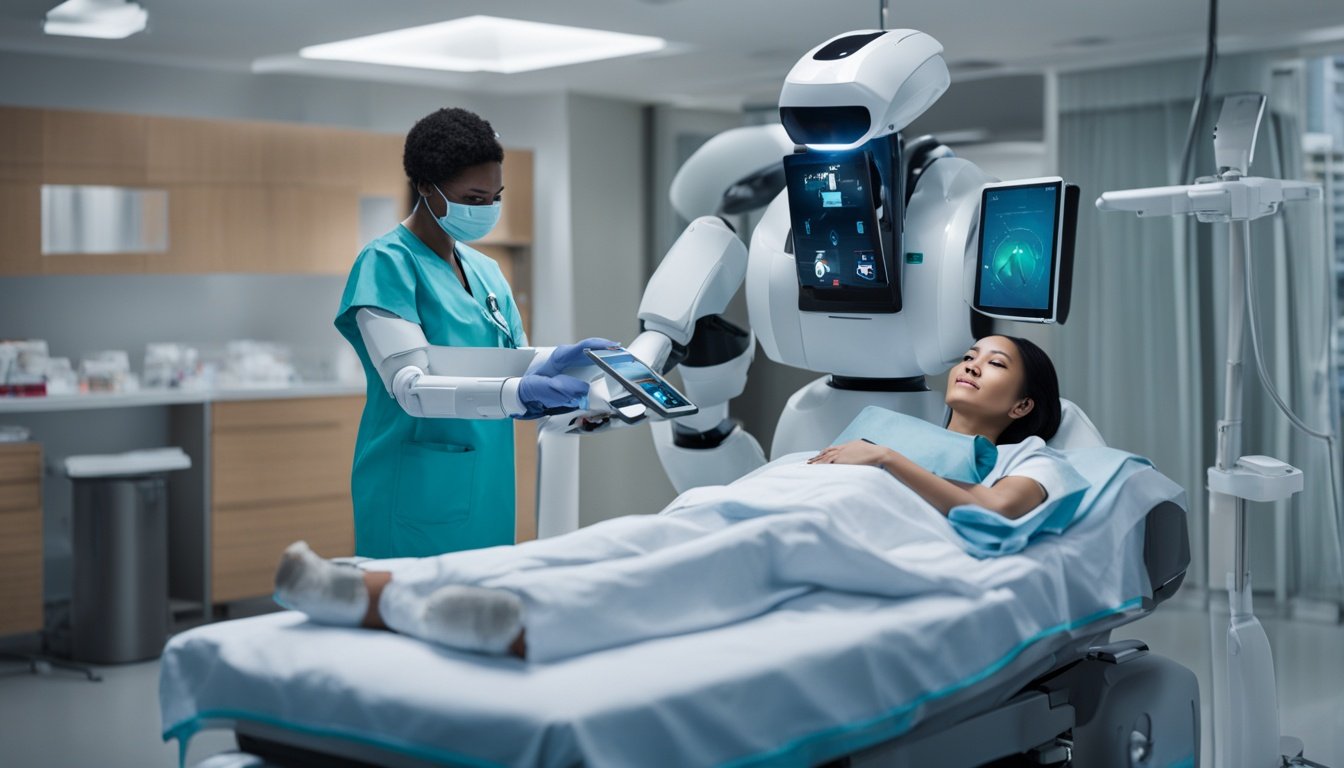AI is changing fast, making us wonder: will it replace doctors? The amount of medical knowledge has grown so much, it’s doubled every 0.2 years by 2020. This means AI can help in many healthcare tasks, like looking at medical scans and helping with treatment plans.
AI has shown it can spot things in medical images that doctors might miss. It can also make treatments more precise, fitting them to each patient’s needs. But, experts say AI won’t replace doctors anytime soon.
Doctors bring empathy, intuition, and a personal touch to healthcare. AI will help, not replace, these skills. It will make doctors’ work better by giving them tools to make smarter decisions and care for patients better.
Key Takeaways
- The doubling time of medical knowledge has decreased from 50 years to 0.2 years, creating opportunities for AI in healthcare.
- AI has shown potential in diagnostics, but cannot replace the human touch and personal connection in healthcare.
- Experts believe AI will complement doctors, not replace them, as the integration of AI and data aims to augment human skills.
- Patients may prefer practitioners who use the latest technologies, but machines cannot fully replicate the empathy and intuition of human physicians.
- The future of healthcare involves a collaborative partnership between doctors, data, and AI for the best patient care outcomes.
The Rise of AI in Healthcare
The healthcare industry has seen a big change with AI and machine learning. These new technologies are changing how doctors diagnose, treat, and keep track of patients. AI tools are making healthcare better by making it more efficient and accurate.
Current Applications and Capabilities
AI is making a big difference in medical imaging and diagnostic tools. Research shows AI can spot invasive cancers in mammograms better than doctors. When AI works with doctors, it makes diagnoses more accurate, using both human and machine smarts.
AI is also helping with treatment plans, watching patients from afar, and in medical research. It looks through lots of data to find patterns and risks. This helps doctors make better decisions and care for patients better.
But, adding AI to healthcare has its problems. Not all patients have the data AI needs, not everyone uses it, and there are worries about jobs and bias. Still, AI’s benefits in healthcare are clear, and it’s becoming more popular. It’s opening up new ways to care for patients and advance medicine.
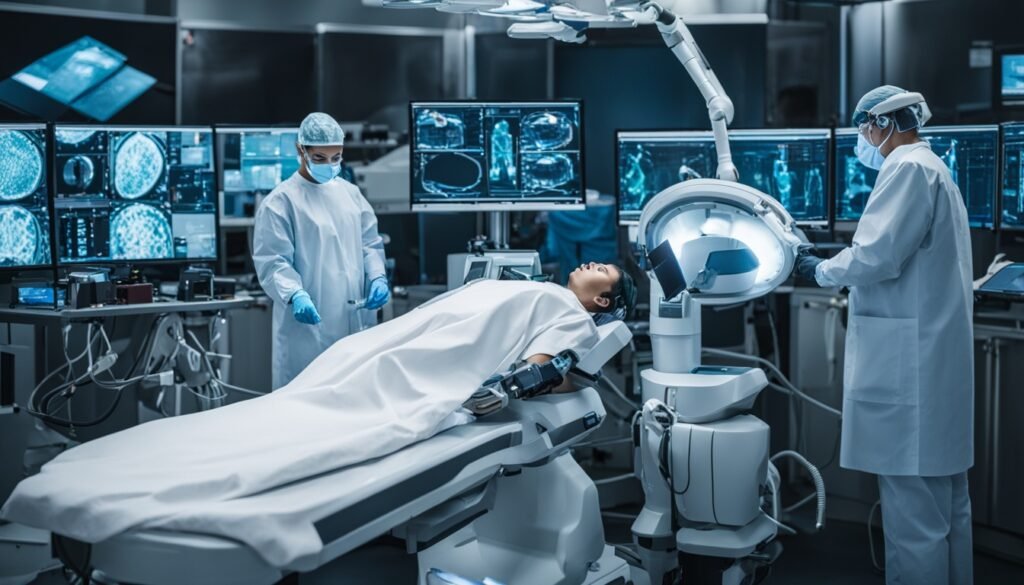
“AI-powered tools are revolutionizing healthcare, enabling more accurate diagnoses, personalized treatment plans, and enhanced medical research. The integration of human expertise and machine intelligence is paving the way for a future where healthcare is more efficient, personalized, and patient-centric.”
The Potential Benefits of AI in Medicine
AI in healthcare brings many promising benefits. It can speed up how fast doctors diagnose patients. AI looks at symptoms and medical data quickly, making diagnoses more efficient and accurate. This means health issues can be caught early and treated faster.
AI also helps create treatment plans that fit each patient’s needs. It looks at a patient’s genes, medical history, and other factors. This leads to treatments that work better and reduce the need for trial and error.
AI makes remote patient monitoring better too. It tracks health and vital signs without needing hospital visits. This helps manage chronic conditions better, leads to early action, and lets patients take a bigger role in their care.
AI speeds up medical research by going through big datasets and finding trends. It automates tasks and finds insights humans might miss. This leads to faster research and new treatments, improving healthcare.
Overall, AI in medicine has huge potential. It makes diagnosing faster, personalizes treatments, improves remote care, and speeds up research. This leads to better health outcomes for patients.
| Benefit | Description |
|---|---|
| Efficiency in Diagnosis | AI systems can quickly analyze patient data to enable more efficient and accurate diagnoses, leading to earlier detection and treatment. |
| Personalized Treatment | AI can help develop tailored treatment plans based on a patient’s unique genetic profile, medical history, and other relevant factors. |
| Remote Patient Monitoring | AI-powered devices and applications can track a patient’s health status and medication adherence, improving chronic disease management. |
| Accelerated Medical Research | AI can sift through large datasets, identify trends, and aid in the development of new treatments, expediting the research and discovery process. |
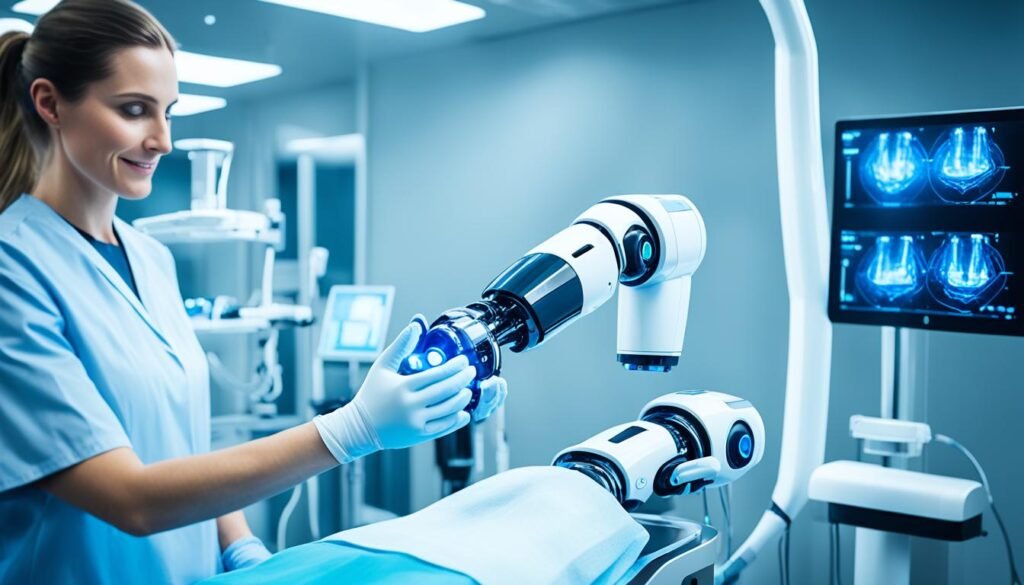
“The potential benefits of AI in healthcare are truly transformative. From enhancing diagnostic efficiency to enabling personalized treatments, the integration of this technology promises to revolutionize the way we approach patient care.”
will ai replace doctors
AI is making big strides in medicine, making us wonder: will it replace doctors? AI can do amazing things like analyze medical images, find new drugs, and manage patient data. But, doctors have qualities that AI can’t match.
Doctors have empathy, intuition, and can connect with patients in a way AI can’t. These qualities are key to giving care that’s both caring and tailored to each patient. AI can’t yet match this kind of care. Instead, AI and doctors will likely work together more, making healthcare better for everyone.
AI can help doctors with paperwork, make workflows better, and help with tough decisions. For instance, robots might help in surgeries, and with better 5G, telehealth and telesurgery will grow. We’ll also see more endoscopy bots and robots for training doctors.
But, adding AI to healthcare brings up big questions. We need to think about jobs, privacy, and fairness in AI use. We must make sure AI helps everyone and keeps the human touch in healthcare.
| Metric | Value |
|---|---|
| Global Surgical Robots Market Projection | $18.4 billion by 2027 |
| AI in Healthcare Market Value (2020) | $8.23 billion |
| AI in Healthcare Market Projection (2030) | $194.4 billion |
| AI in Healthcare Market Growth Rate (2021-2030) | 38.1% CAGR |
The future of healthcare will be shaped by the partnership between AI and doctors. AI will make healthcare more efficient and accurate. But, it can’t replace the empathy and personalized care doctors give. The best healthcare will come from combining AI and human skills for the best patient care.
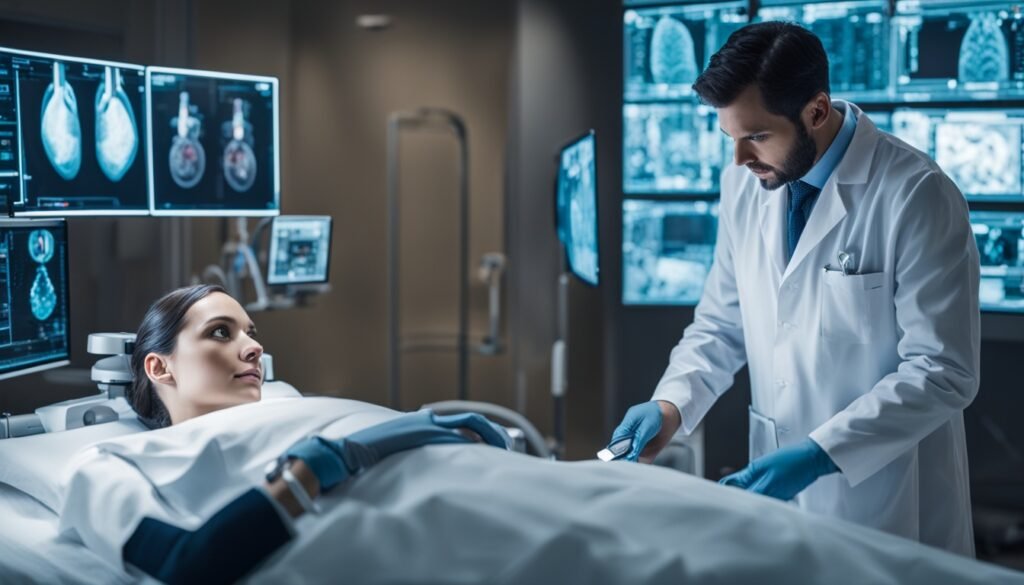
“Robots and AI are more likely to complement traditional care rather than replace doctors entirely.”
Addressing Concerns and Challenges
Job Displacement, Data Privacy, and Algorithmic Bias
AI is making big steps in healthcare, but we must tackle the issues it brings. One big worry is job loss, as AI might take over some tasks done by healthcare workers.
A study from the University of Oxford says doctors face a small chance of losing their jobs to AI. This shows we need to work together to help workers and make sure AI helps, not harms, healthcare.
Data privacy is another big concern. AI needs lots of data, which means keeping patient info safe is more important than ever. We must follow strict rules to protect patient data.
AI also brings up the issue of algorithmic bias. This means AI might make decisions based on old biases, leading to unfair treatment in healthcare. We need to watch closely and take steps to fix this.
To fix these problems, doctors, policymakers, and AI makers must work together. We need strong rules, clear algorithms, and ways to check on AI use. By focusing on what’s best for patients and being ethical, we can use AI in healthcare right.
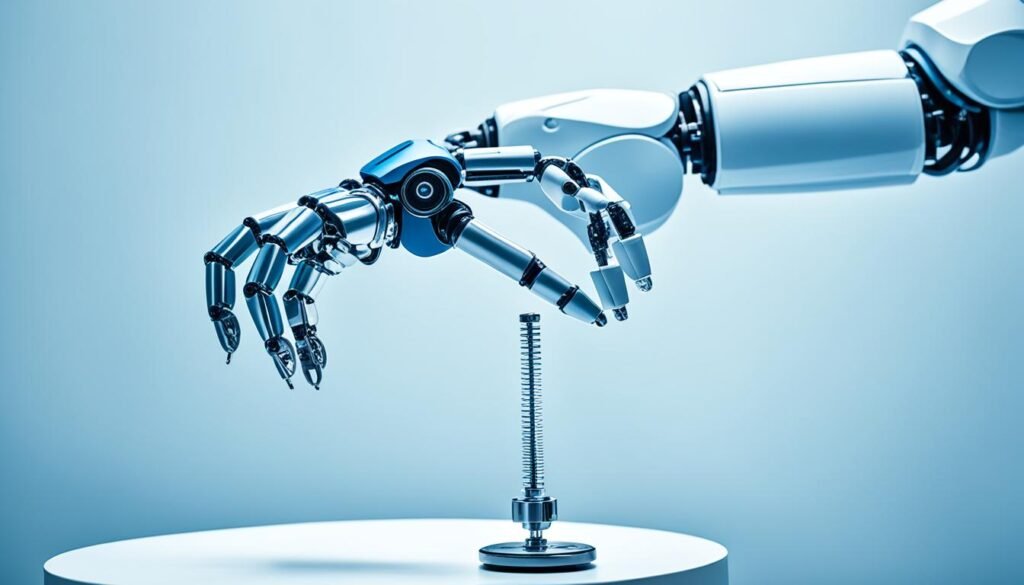
The Doctor-AI Partnership
AI won’t replace doctors, but will work with them in a new way. This partnership combines human knowledge with AI’s power. Together, they promise to make healthcare better and more efficient.
AI can help doctors make smarter choices and focus on caring for each patient’s needs. It takes over simple tasks and helps with data analysis. This lets doctors spend more time with patients.
| AI Applications in Healthcare | Potential Benefits |
|---|---|
| Radiology and Imaging Analysis | Improved accuracy in detecting conditions like lung cancer and breast cancer, reducing false positives by up to 11%. |
| Dermatology and Skin Cancer Diagnosis | AI algorithms have performed on par with or better than experienced dermatologists in identifying skin cancer. |
| Clinical Decision Support | AI-powered systems can assist doctors in making more accurate diagnoses and treatment recommendations, potentially reducing the 30% error rate in radiology. |
The partnership between humans and AI in healthcare is about working together. Doctors use AI’s ability to spot patterns and do complex calculations to help them make better decisions. At the same time, AI can’t replace the human touch, empathy, and intuition that doctors bring.
This partnership opens up new possibilities in healthcare. It leads to better care for patients and a more sustainable healthcare system.
“The healthcare future is envisioned as humans leading with AI support, with clinicians making critical decisions.”
Market Opportunities and Recent Developments
The global AI in healthcare market is booming. A recent report by Allied Market Research found it was worth $8.23 billion in 2020. By 2030, it’s expected to hit $194.4 billion, growing at a 38.1% CAGR from 2021 to 2030. This shows how fast AI is becoming a key part of healthcare, from medical imaging to drug discovery.
Big names like IBM Watson Health, Google Health, and NVIDIA are leading the charge in AI healthcare solutions. They’re making huge strides in this field. In fact, AI could save the US up to $150 billion annually by 2026.
Emerging Trends and Innovations
AI is becoming more common in healthcare, helping doctors with things like mammogram interpretations. The World Economic Forum believes AI will improve healthcare outcomes. For example, Etcembly, an Oxford firm, used Generative AI to create a new immunotherapy drug, showing AI’s potential in drug discovery.
India is also seeing a lot of AI healthcare innovation. This shows how global this tech revolution is. As healthcare workers face burnout, AI could help make things better for everyone.
Challenges and Considerations
But, adding AI to healthcare isn’t easy. There are worries about biases in AI data, which could make healthcare unfair. Doctors also want clear evidence and rules on using AI, and they’re unsure about getting paid for it.
A symposium brought together experts to talk about making AI in healthcare work right. It’s important that patients and doctors trust these new tools. And, these tools shouldn’t add more stress to healthcare workers.
| Market Opportunity | Recent Developments | Challenges |
|---|---|---|
|
|
|
As the AI in healthcare market grows, we must tackle these challenges. We need to make sure AI is used responsibly and fairly. This way, we can use AI to improve healthcare, make things more efficient, and give better care to everyone.
The Human Touch in Healthcare
As AI changes healthcare, keeping the human element in healthcare is key. AI helps with medical tasks, but it can’t match the compassion and personal connection doctors and nurses give. These professionals offer empathy and emotional support that AI can’t.
Patients look for healthcare providers who care with empathy and understanding. Being able to answer questions, offer reassurance, and provide a listening ear is unique to humans. This personal connection is vital for patients’ well-being and trust in their care.
The human touch in healthcare is more than just doctor-patient talks. Nurses give emotional support, teach patients, and manage care plans. Their skill in building relationships and trust with patients is key for good care, especially with chronic conditions and end-of-life care.
With more AI in healthcare, we must remember the importance of compassion in medicine. Doctors and nurses should keep improving their emotional intelligence and people skills. This keeps the patient-doctor relationship in AI-powered healthcare strong and meaningful.
“The art of medicine consists in amusing the patient while nature cures the disease.” – Voltaire
The human touch in healthcare can’t be replaced. AI helps with many medical tasks, but it’s the empathy and personal connection from healthcare workers that truly changes patients’ lives. By balancing tech with the human element in healthcare, we can get the best care for patients.
Future Prospects and Predictions
As the integration of AI in healthcare grows, experts see a closer partnership between AI and doctors. AI will boost healthcare by improving diagnosis, treatment plans, and remote monitoring. Yet, doctors’ core roles will stay important.
Doctors will use AI as a tool to help them. This lets them focus more on caring for patients and making decisions. As AI and healthcare tech advance, patients might start using AI for certain medical tasks. This could give doctors more time to give personalized care.
| AI Advancements in Healthcare | Potential Impact |
|---|---|
| AI chatbots provided a more accurate response 78.6% of the time compared to physician responses to common patient medical questions. | Improved accessibility and accuracy in initial patient triage and diagnosis. |
| AI chatbots had a 9.8 times higher prevalence of providing empathetic responses. | Enhanced patient experience and emotional support, particularly for mental health concerns. |
| AI can help in the early detection and diagnosis of various diseases. | Faster and more accurate identification of health issues, leading to earlier intervention and improved patient outcomes. |
| AI can help reduce physician burnout through assisting with clinical documentation, paperwork, and clerical tasks. | Increased efficiency and work-life balance for healthcare professionals, leading to better patient care. |
The future of AI in healthcare looks promising. Predictions on AI-doctor relationship and advancements in medical AI technologies suggest a future where AI and doctors work together. This will lead to better patient care and healthcare delivery.
“AI is viewed as a tool to complement doctors, with the idea that doctors using AI will eventually replace those who do not utilize it.”
The future of AI in healthcare looks bright. Future prospects and predictions for the AI-doctor relationship and medical AI advancements show a future where technology and healthcare professionals work together. This will improve patient outcomes and healthcare delivery.
Conclusion
The use of artificial intelligence in healthcare is growing and changing. AI can make healthcare better by making things more efficient and helping with personalized treatments. It can also help with medical research.
But, AI won’t replace human doctors. Doctors bring things to healthcare that AI can’t, like empathy and understanding patients on a personal level. These qualities are key to healthcare.
The future of healthcare will likely see AI and doctors working together. This way, AI can support the skills of healthcare workers. It’s important to keep the human touch in healthcare as we use more technology. This ensures that AI is used in a way that puts patients first and is ethical.
AI in healthcare brings both good things and challenges. It can make healthcare better and help with problems like bias and unequal healthcare. By using the best of AI and human doctors, we can make sure healthcare in the future is the best it can be for everyone.
FAQ
Will AI replace doctors in the healthcare industry?
AI is making big strides in healthcare, but it won’t replace doctors soon. Doctors bring empathy, intuition, and personal connection to healthcare. These qualities will keep doctors at the heart of healthcare, even as AI gets better.
What are some current applications of AI in healthcare?
AI is used in healthcare for fast diagnosis, making treatment plans, monitoring patients remotely, and speeding up research. It can look at medical images, understand test results, and give insights that help doctors.
What are the potential benefits of integrating AI in healthcare?
AI in healthcare has many benefits. It speeds up diagnosis, makes treatment plans more personal, lets doctors monitor patients from afar, and speeds up research by looking through lots of data for trends.
What are the concerns and challenges associated with the integration of AI in healthcare?
There are worries about AI taking jobs, keeping patient data safe, and biased algorithms. Doctors, policymakers, and tech experts need to work together. They should focus on making AI help patients and be ethical.
What is the future relationship between AI and doctors in healthcare?
The future will likely see AI and doctors working together. AI will support doctors, not replace them. Doctors will use AI to focus more on caring for patients and making decisions.
What is the current and projected growth of the AI in healthcare market?
The AI in healthcare market is growing fast. It was worth .23 billion in 2020 and could hit 4.4 billion by 2030. It’s expected to grow by 38.1% each year from 2021 to 2030.
Why is the human touch in healthcare important, even with the integration of AI?
Human doctors can understand patients’ feelings, answer questions, and support them in tough times. This personal touch is something AI can’t do. Keeping this human side in healthcare is crucial, even with more AI.
